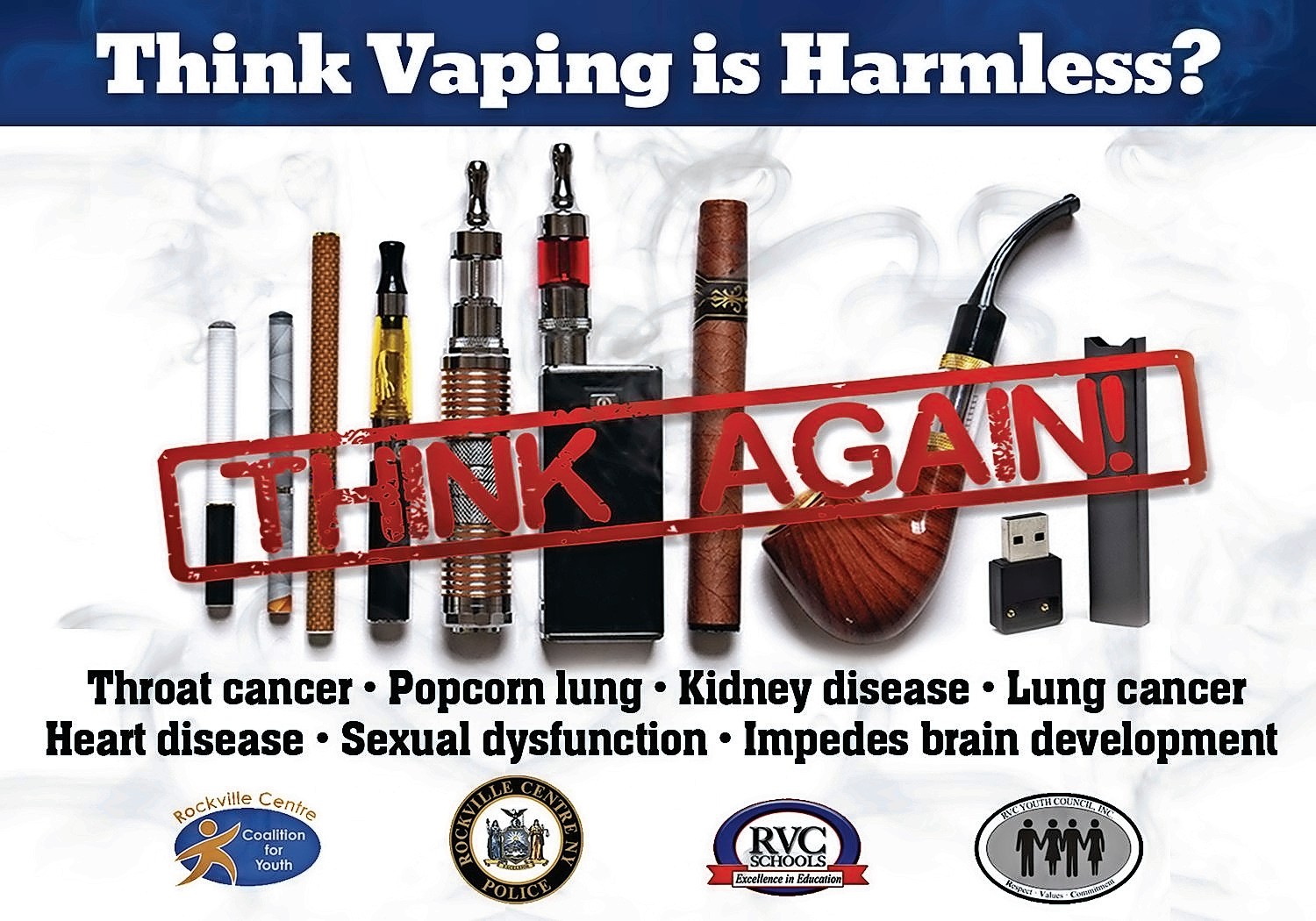Friday, April 26, 2024
 39.0°,
Fair
39.0°,
Fair
Rockville Centre Coalition for Youth continues fight to curb vaping
The Rockville Centre Coalition for Youth is ramping up efforts to curb electronic cigarette use among adolescents. From informing local parents to pushing for stricter policies in Washington D.C., the coalition’s member institutions are facing the issue head-on.
“It’s the new generation of tobacco,” said Andrea Connolly, chairwoman of the Rockville Centre Youth Council. “When I was in middle and high school, it was cool to smoke Marlboros. Now, it’s vaping. Peer pressure is stronger than knowledge at that age.”
The U.S. Surgeon General issued a warning in 1964 that cigarettes were linked to lung cancer. In December, it issued an advisory about the newer, sleeker tobacco products — e-cigarettes, also known as vaping devices or vapes — which its makers say can help cigarette smokers quit.
Since 1964, cigarette smoking by Americans has steadily decreased from 42 percent to 18 percent in adults, according to the 2014 Surgeon General’s report, which also stated that youth cigarette smoking was down to 6.6 percent. But the prevalence of e-cigarettes has spurred a new way to inform people about the devices’ dangers.
The U.S Department of Health and Human Services launched an educational webpage on e-cigarettes targeted toward young people. It states that in 2018, one in five high-school students reported using e-cigarettes in the past month. The warning cited brain risks, behaviors risks and addiction as possible results of vaping.
Dr. David Flomenhaft, director of Outpatient Behavioral Health Services at Mercy Medical Center in Rockville Centre, praised the Surgeon General’s warning, but noted that, unfortunately, it may have come too late for some.
“It’s a crisis among adolescents and adults, and it’s important for people to wake up and realize that it’s not benign just because it’s not a cigarette,” he said. “These toxic chemicals have an effect on developing brains, which continue to develop until the age of 25. It affects memory, attention and learning, which are all especially important in middle school, high school and college-age students.”
An 11th grader at South Side High School, who wished to remain anonymous, said she first puffed on a Juul — one of the most popular vaping devices among teenagers — about two years ago, when her friend offered it to her at a party. “A lot of my friends have them,” she said. “I’ve especially seen them on Instagram and just thought it was cool and different.”
In 2015, Juul released ads targeting a young audience, which included heavy marketing on social media. Today, the advertising campaign has shifted to adults who wish to quit cigarettes, but has still gained criticism from concerned communities who believe this sends a message to young people that using vapes are safe.
While the South Side 11th grader said she only uses her Juul about once a week when she’s with her friends, she knows others who may be addicted and “freak out if they don’t have pods.”
She added that she believes there’s no solid research yet to know what the effects of vaping will be, and if she finds herself relying on it, she will pull back. “It’s the responsibility of the user to recognize the problem,” she said.
Last year, a 15-year-old boy from North Carolina was sent to rehabilitation for e-cigarette addiction, fueling the ongoing, national dialogue about youth vaping.
“Youths are abusing the pods for the nicotine rush and the flavor,” said Ruthanne McCormack, project coordinator for the Rockville Centre Coalition for Youth. “Now they’re getting hooked on nicotine, so they can’t stop once they start.”
McCormack, along with others representing similar anti-drug organizations from across the country, attended a public hearing on Jan. 18 at the Food and Drug Administration’s headquarters in Maryland to share her concerns. There, students shared their personal nicotine addiction stories.
Discussions at the hearing focused on possible legislation to curb vape sales to minors and various therapies that could be used to treat adolescents addicted to nicotine. “The FDA said this isn’t the end of the conversation,” McCormack said. “There are different laws we want to instill.”
In Rockville Centre, McCormack is working to get Juul pods off store shelves and out of young people’s hands. Although Juul suspended the sale of certain flavored pods in brick-and-mortar stores last November, 7-Eleven in Rockville Centre continues to sell them, she said. She keeps frequent contact with local stores to see that the product is removed.
Additionally, the Coalition has re-launched its sticker campaign, distributing anti-vaping messages to local businesses and other community members.
In March, the Coalition and the Youth Council are set to welcome neuroscientist Dr. Steven Dewey to speak to students about the respiratory and neurological health risks of vaping.
“Everything is a process and therefore takes time,” Connolly said. “We are incredibly hopeful, through the combined efforts of the RVC Youth Council, RVC Coalition for Youth and the RVC Police Department, that we will continue to contribute to the health and safety of our youth.”
HELP SUPPORT LOCAL JOURNALISM
The worldwide pandemic has threatened many of the businesses you rely on every day, but don’t let it take away your source for local news. Now more than ever, we need your help to ensure nothing but the best in hyperlocal community journalism comes straight to you. Consider supporting the Herald with a small donation. It can be a one-time, or a monthly contribution, to help ensure we’re here through this crisis. To donate or for more information, click here.
Sponsored content
Other items that may interest you






